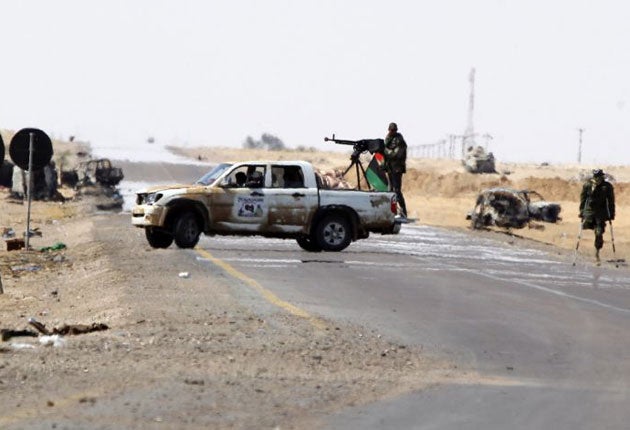Your support helps us to tell the story
From reproductive rights to climate change to Big Tech, The Independent is on the ground when the story is developing. Whether it's investigating the financials of Elon Musk's pro-Trump PAC or producing our latest documentary, 'The A Word', which shines a light on the American women fighting for reproductive rights, we know how important it is to parse out the facts from the messaging.
At such a critical moment in US history, we need reporters on the ground. Your donation allows us to keep sending journalists to speak to both sides of the story.
The Independent is trusted by Americans across the entire political spectrum. And unlike many other quality news outlets, we choose not to lock Americans out of our reporting and analysis with paywalls. We believe quality journalism should be available to everyone, paid for by those who can afford it.
Your support makes all the difference.Libyan rebels begged for more Nato air strikes today, saying they faced a massacre from government artillery barrages on the besieged city of Misrata, but Western allies squabbled over the air campaign.
Rebels said a hail of Grad rockets fired by besieging forces into a residential district of Misrata, Libya's third largest city, had killed 23 civilians, mostly women and children.
Aid organisations warn of a humanitarian disaster in Misrata, the lone rebel bastion in western Libya, where hundreds of civilians are said to have died in a six-week siege.
US Secretary of State Hillary Clinton expressed concern at a Nato meeting in Berlin over "atrocities" in Misrata but gave no hint Washington was prepared to re-engage in air strikes.
Reflecting concern over strains in the alliance, Clinton called for Nato to maintain "resolve and unity" against Muammar Gaddafi, saying he was trying to test Western resolve.
Several Nato members rebuffed calls from France and Britain to contribute more to the air attacks, conducted under a United Nations mandate to protect civilians and US officials said allied commanders were not requesting greater resources.
"A massacre...will take place here if Nato does not intervene strongly," a rebel spokesman in Misrata told Reuters by phone. Reports of casualties are hard to verify independently because journalists cannot reach the area.
Al Jazeera television showed hundreds of residents demonstrating after the dawn attack. "The blood of martyrs will not be in vain," they chanted, waving the rebel flag.
Five so-called BRICS emerging powers - Brazil, Russia, India, China and South Africa - expressed misgivings about Nato air strikes after talks in China and urged an end to the two-month civil war.
Their criticism contrasted with the first joint call for Gaddafi's overthrow from a group of Middle Eastern and Western countries meeting in Qatar yesterday.
In its strongest language yet, the international "contact group" on Libya demanded that Gaddafi leave power and voiced support for the rebels.
Some military analysts believe US specialist ground attack aircraft could tip the balance in Libya, allowing precision strikes on Gaddafi's armour with less risk of hitting civilians. But Washington has taken a back seat after handing command to Nato on March 31.
French Defence Minister Minister Gerard Longuet said this week Gaddafi's attacks would not be stopped without US participation in strikes on his tanks and artillery. A French official cited Spain, Italy, the Netherlands and Sweden among other allies who could do more.
But Spain said it had no plan to join the seven Nato states that have conducted ground strikes while Italy, Libya's former colonial power, expressed reluctance to launch attacks.
Amid a flurry of international diplomacy over Libya, UN Secretary General Ban Ki-moon, EU foreign policy chief Catherine Ashton, Arab League head Amr Moussa and officials from the African Union and Organisation of the Islamic Conference discussed the war at a meeting in Cairo today.
A few dozen pro and anti-Gaddafi protesters demonstrated outside the meeting at Arab League headquarters.
Ban expressed grave concern over the escalation of violence in Libya and called for a ceasefire and the relief of besieged cities. The longer fighting went on, the more difficult a political solution would be, he said.
Clinton said in Berlin there could be no viable political transition until Gaddafi left power.
Britain and France are leading air strikes against Gaddafi's forces, but have grown frustrated with the lack of support from their allies. Nato says it is still short of about 10 aircraft a day for strikes.
Nato members are also divided over meeting a rebel request for weapons. Spanish Foreign Minister Trinidad Jimenez said this was not allowed under the UN resolution authorising military action but other nations suggested it could be possible.
The rebels said they were in talks with "friendly" countries to obtain arms: "I don't think there will be a problem getting weapons," national council spokesman Abdel Hafiz Ghoga told reporters in the rebel stronghold of Benghazi.
Juppe said in Berlin that France was not currently in favour of arming the rebels and the Nato campaign would not be enough to topple Gaddafi. A political solution was essential, he said.
Qatar, a leading Arab supporter of the uprising, hinted yesterday that it might arm the rebels.
Britain says it will supply them with 1,000 sets of body armour from surplus supplies on top of 100 satellite phones already sent.
Subscribe to Independent Premium to bookmark this article
Want to bookmark your favourite articles and stories to read or reference later? Start your Independent Premium subscription today.

Join our commenting forum
Join thought-provoking conversations, follow other Independent readers and see their replies
Comments